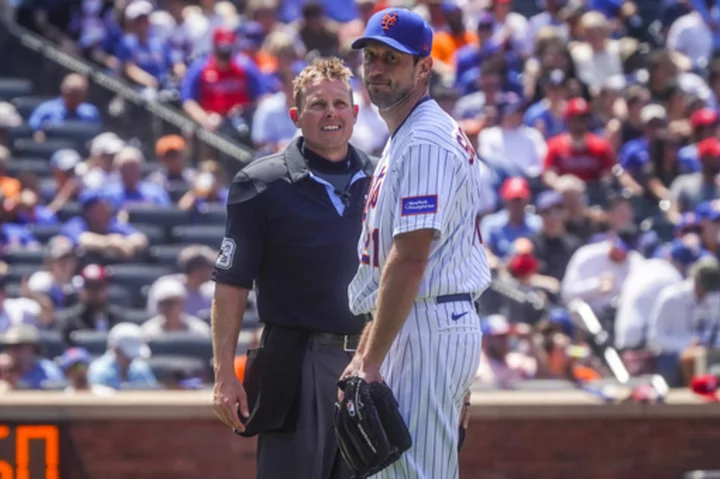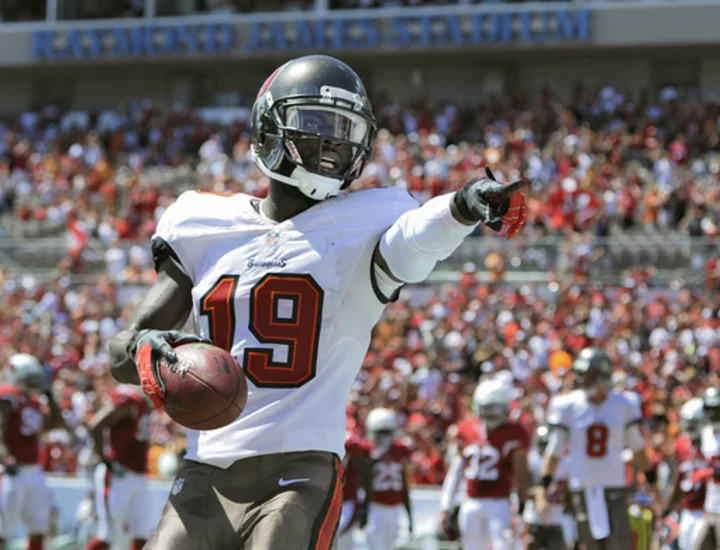NEW YORK (AP) — Warming up to start the fifth inning, Max Scherzer was stopped by umpire Tripp Gibson from throwing his eighth and usually last warmup pitch. The 2-minute, 15-second clock between innings had run down.
The New York Mets starter walked over to the plate ump, held out his hands as they talked, then turned around and threw up an arm in disgust.
“Why do we have to be so anal about this, to have the clock up everybody's face, shoved in everybody's face, and try to step out every little single second that's going through the game?" Scherzer said Thursday after beating the Philadelphia Phillies 4-2. “It’s situations like that that really are frustrating for not only for pitchers, players but even the umpires."
Scherzer, a three-time Cy Young Award winner, is not fan of the pitch clock that started this season, which calls for 15 seconds between pitches with no runners on base and 20 seconds when there are runners. He was charged with a balk in spring training for attempting to quick pitch.
His warmup throws were delayed Thursday when rookie Francisco Álvarez made the last out of the fourth and had to put on his catcher's gear.
“Tripp's handcuffed. Why is Tripp handcuffed to not allow something normal, a normal routine, just a normal routine, why can't Tripp make that call?” Scherzer said. "He said thank you for speaking out for the umpires because the umpires want to have that discretion. They want to allow the game to be normal. But the umpires are frustrated, as we are, that the game’s not normal, that we’re just living and dying by the clock. And so that was our conversation. I said, look, I’ll speak for you. We're way too far thinking about the clock in every single situation instead of letting players have their normal routines.”
Scherzer said Gibson was understanding about the situation.
“I can't do anything about it, because if I let you throw the pitch, then MLB gets mad at him,” Scherzer said, recounting their conversation.
“Why do we need a pitch clock for that situation?" Scherzer said. “If I throw one more pitch, what, I’m one second slower? Why can’t the umpire have discretion in that situation to allow a pitcher to throw his eight normal warmup pitches?”
Fans generally have approved of the clock, which has caused the average time of a nine-inning game to drop 28 minutes to 2:37. Scherzer had praised the clock earlier this season for eliminating dead time.
Scherzer improved to 3-0 in his last four starts, striking out a season-high nine while allowing two runs — one earned — and five hits in seven innings. The 39-year-old right-hander is 5-2 with a 3.21 ERA in his second season with the Mets.
He said it has taken time to find a rhythm with the clock and the PitchCom device introduced last year that has led to fewer catchers using fingers to signal pitches.
With Scherzer pitching to Álvarez, batters swung at 24 of Scherzer's 49 fastballs and missed 15 of them.
“I want Alvy to call the game. I don’t want to have to override him. I don’t want to have to call the pitch unless I really know it,” Scherzer said. “And so that's where kind of getting in the rhythm of when I kind of know where the clock’s at, let him call a few. And then if we are running out of time, find a way like, hey, I need this pitch right now. So that’s kind of where we’re getting in rhythm of that, of how we use the PitchCom, because we’re only using PitchCom only, we’re not using any fingers. And that’s a big change for me, it's so foreign.”
___
AP MLB: https://apnews.com/hub/MLB and https://twitter.com/AP_Sports









